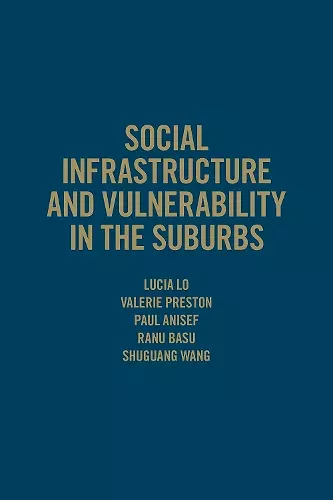Social Infrastructure and Vulnerability in the Suburbs
Paul Anisef author Valerie Preston author Shuguang Wang author Lucia Lo author Ranu Basu author
Format:Hardback
Publisher:University of Toronto Press
Published:7th Apr '15
Currently unavailable, and unfortunately no date known when it will be back

"Social Infrastructure and Vulnerability in the Suburbs examines an important trend which is occurring throughout North America - the suburban settlement of the elderly, the poor, and immigrants. Clearly written, full of rich data, this book outlines how suburban growth in a neoliberal context affects social vulnerability and offers specific policy recommendations to reduce social inequality." -- Emily Skop, Department of Geography and Environmental Studies, University of Colorado, Colorado Springs "Social Infrastructure and Vulnerability in the Suburbs casts light on the socioeconomic changes affecting the suburbs and illustrates the growing polarization and diversity of this urban sector. An empirical study of the use of and access to York Region education, social housing, employment, and settlement services, this book addresses questions such as the nature of metropolitan development, emerging geographies of urban inequality, and the entrenchment of neoliberalism." -- Pierre Filion, School of Planning, University of Waterloo
Social Infrastructure and Vulnerability in the Suburbs examines how the combination of the low-density, car-centric geography of outer suburbs and neoliberal governance in the past several decades has affected disadvantaged populations in North American metro areas.
Social Infrastructure and Vulnerability in the Suburbs examines how the combination of the low-density, car-centric geography of outer suburbs and neoliberal governance in the past several decades has affected disadvantaged populations in North American metro areas. Taking the example of York Region, a large outer suburb north of Toronto, the authors provide a spatial analysis that illuminates the invisible geography of vulnerability in the region.
The volume examines access to social services by vulnerable groups who are not usually associated with the suburbs: recent immigrants, seniors, and low-income families. Investigating their access to four types of social infrastructure – education, employment, housing, and settlement services – this book presents a range of policy recommendations for how to address the social inequalities that characterize contemporary outer suburbs.
ISBN: 9781442650244
Dimensions: 236mm x 159mm x 20mm
Weight: 440g
208 pages